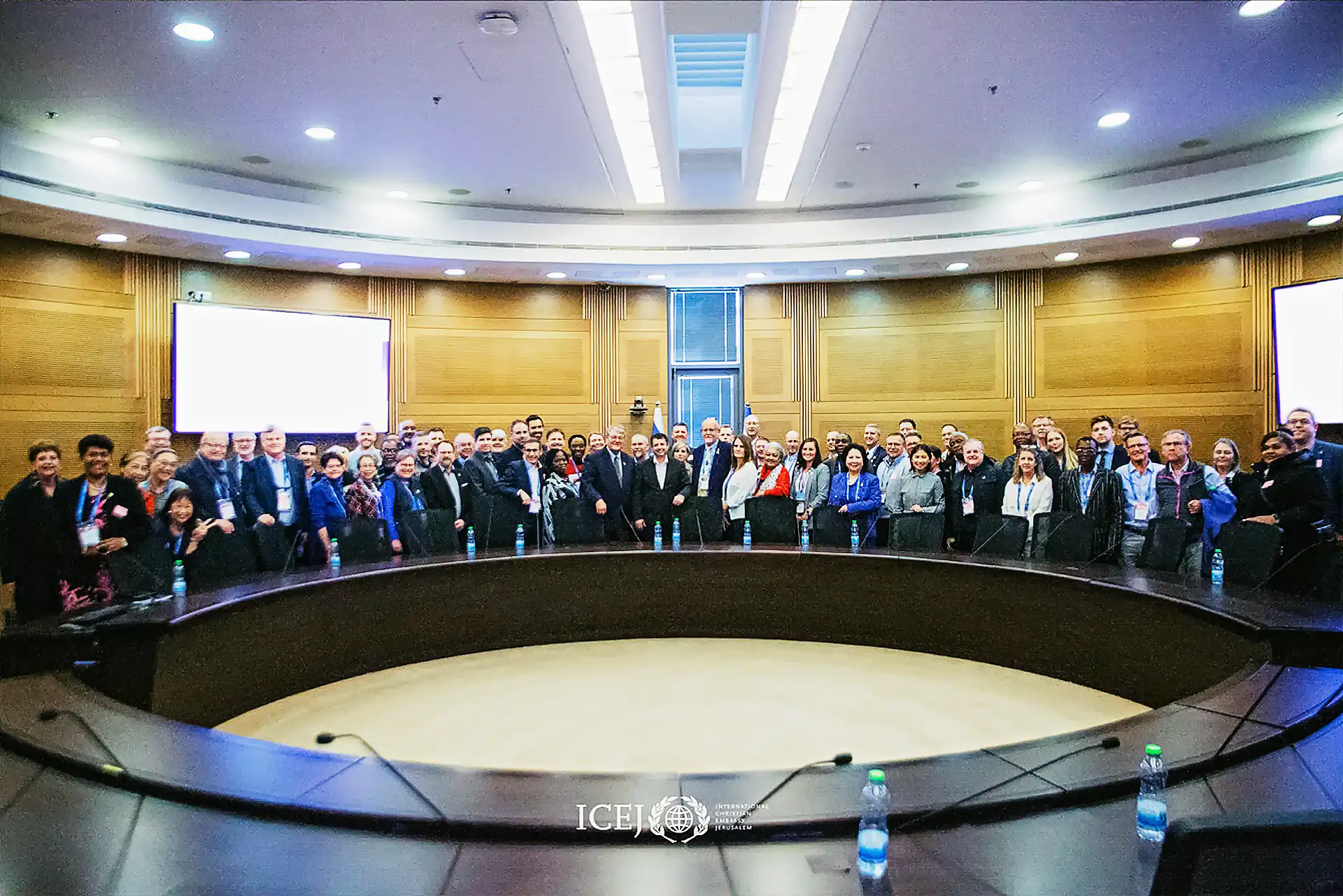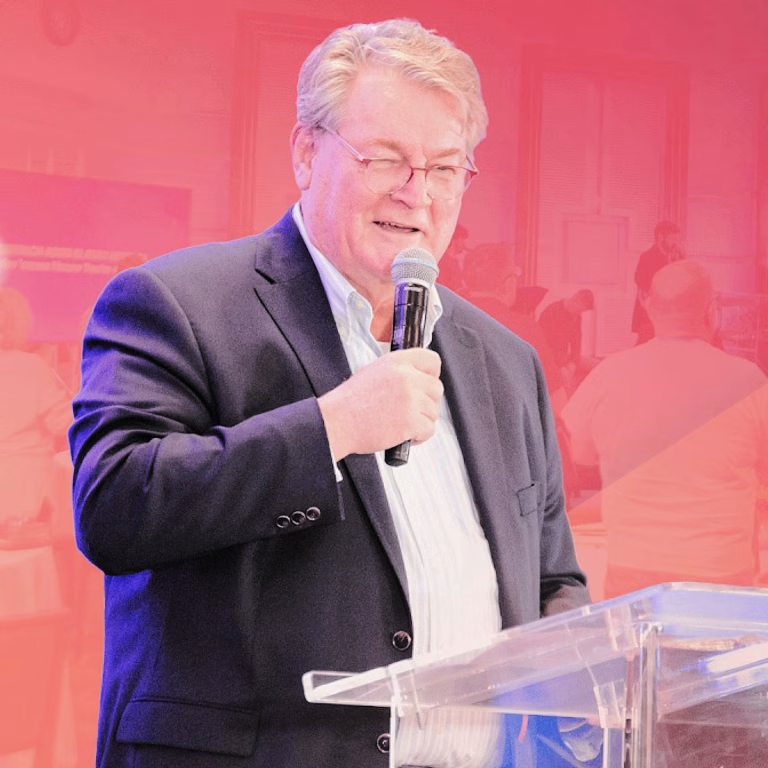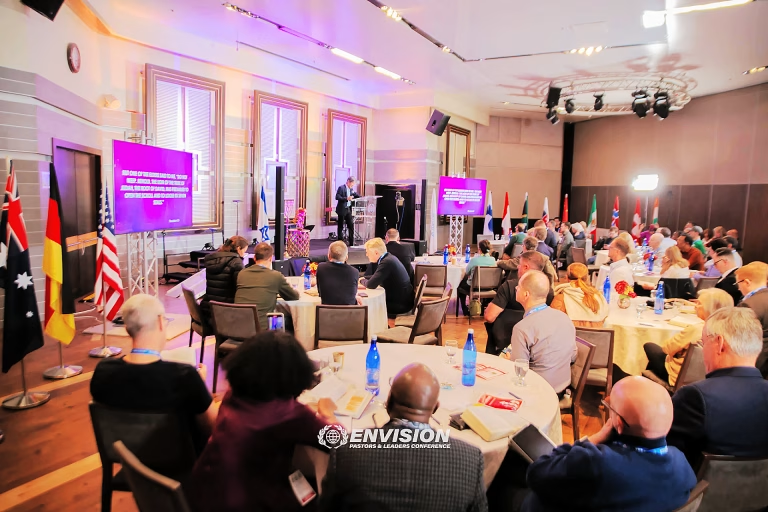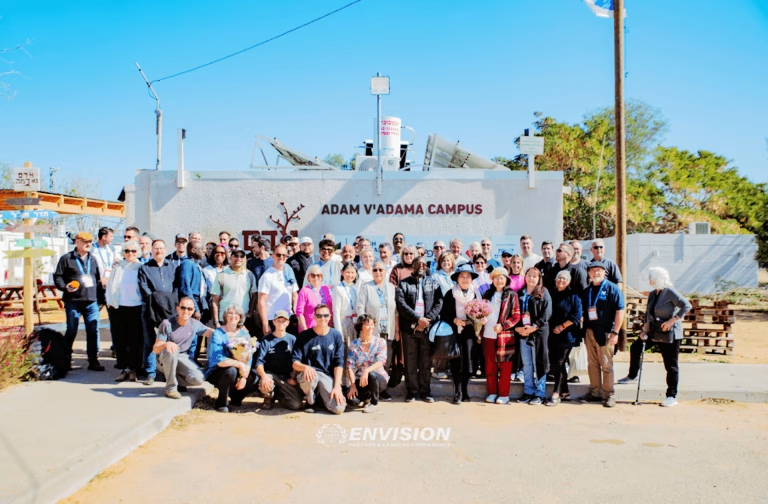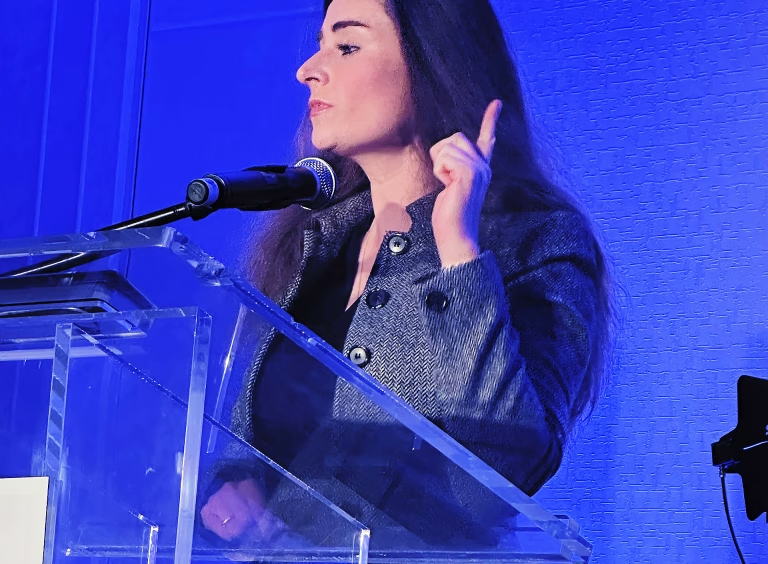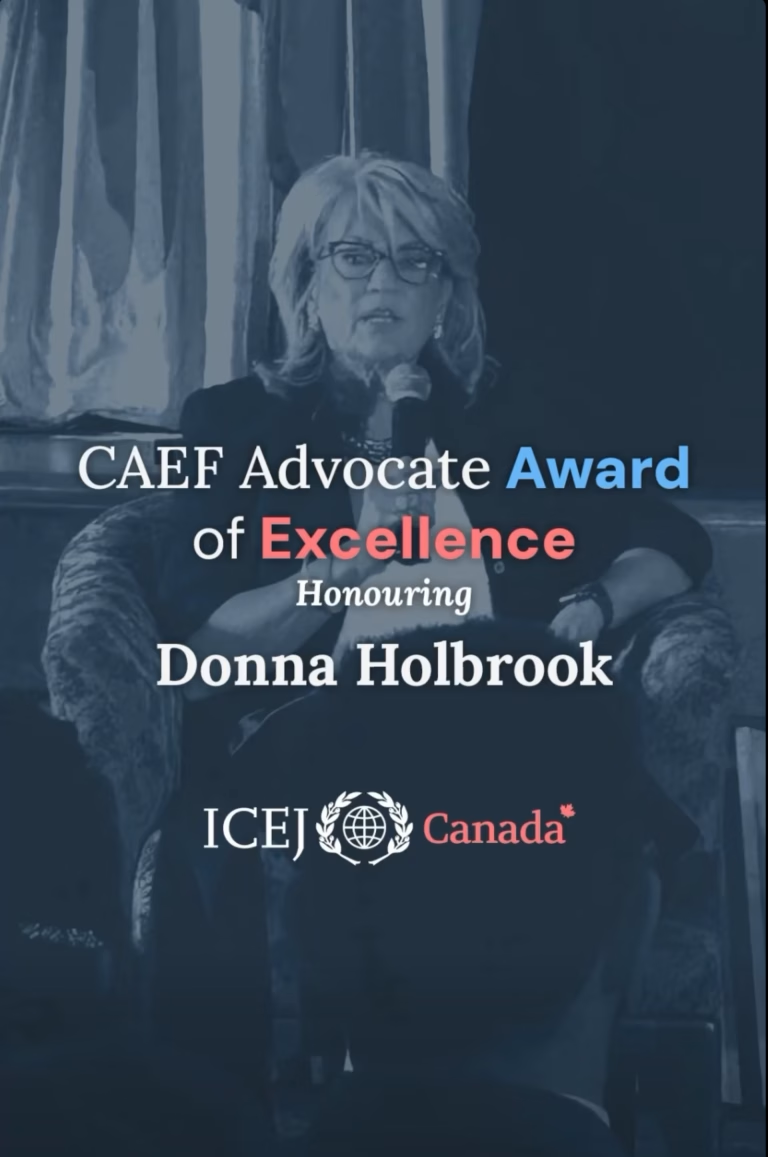This year’s Envision conference in early February drew 77 pastors and ministry leaders from some 20 countries to Jerusalem for four days of meetings and day tours to the battlefronts of the 16-month war in southern and northern Israel. With fragile ceasefires holding on both fronts, the pastors enjoyed messages from seasoned ministers on the theme ‘Leading by the Spirit’, heard from Israeli security analysts and hostage family members, and visited border communities deeply impacted by the fighting since the atrocities of October 7, 2023.
DAY ONE
On the first evening, Israeli pastor Daniel Yahav of the Peniel Fellowship in Tiberias shared how at one point up to 50 members of his congregation were called up for army reserve duty. “While physically you are running and emotionally you are up and down, deep inside there was peace,” he assured. Yahav added that his congregants have many testimonies of miracles and victories in this battle, but they also recently had to bury a member of their fellowship who died in battle.
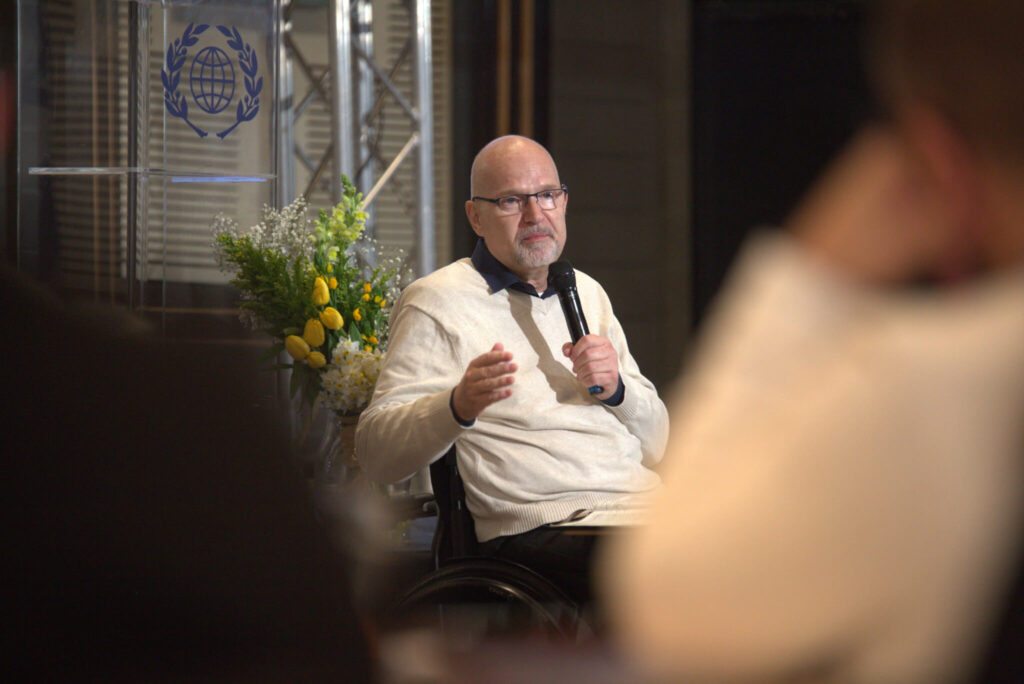
ICEJ President Dr. Jürgen Bühler delivered the main message that first night, having returned from an extended medical leave. He gave insights on the spiritual battle currently surrounding Israel as depicted prophetically in the struggle between the woman and the dragon in Revelation chapter 12.
DAY TWO
The following morning opened with ICEJ Senior Vice President David Parsons speaking on the origins of this spiritual battle as found in Genesis chapters 14-15 and the way God promised to always be a “shield” to Abraham and his descendants, to guard the incredible redemptive mission he had called them to. “The spirit of antisemitism is now rampant in the world, and the Bible gives it a name – ‘Amalek’,” he stated.
Israeli pastor Peter Tsukahira delved deeper into this spirit of Amalek and the lingering challenge of Replacement theology in the Church today. He especially counseled the Envision pastors to understand the Gospels better by embracing the Jewish Jesus.
Benjamin Berger, another local Israeli pastor, shared a thought-provoking message on the early Jewish church and the direction in which God is leading Christians today. He described the Church as “the one Bride, Jew and Gentile united… a bride who not only reflects but also reveals the nature of God.”
The opening morning sessions concluded with a current affairs briefing by Dr. Mordechai Kedar, offering valuable insights into the ongoing jihad (Islamic holy war) against Israel and the geopolitical challenges which the entire region faces.
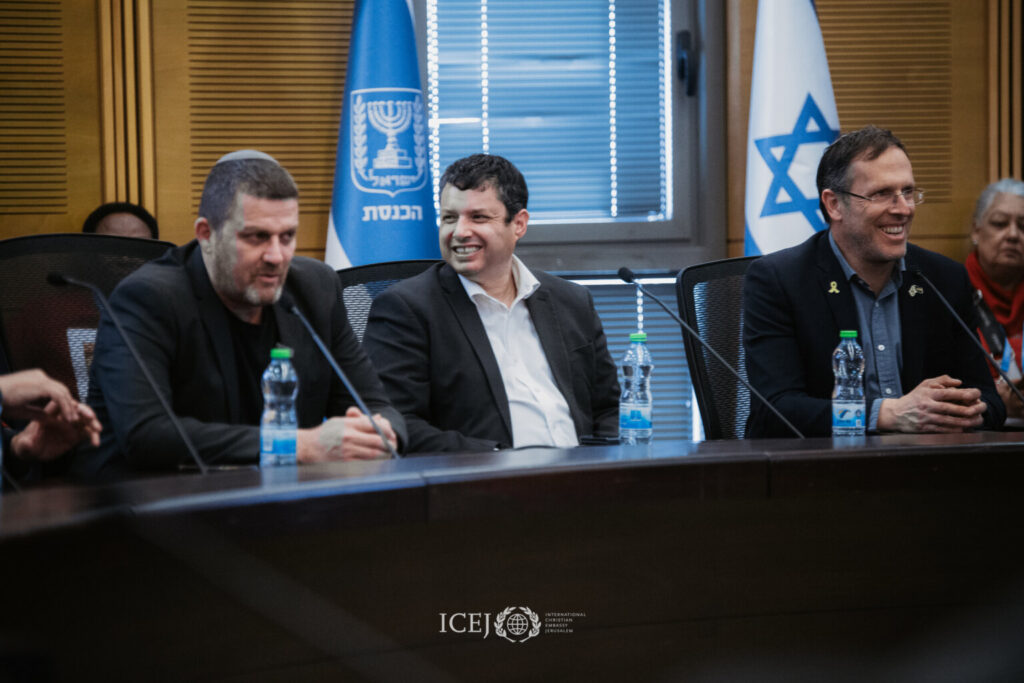
That afternoon, the Envision delegates visited the Knesset, where they were addressed by three members of the Israeli parliament as well as Josh Reinstein, Director of the Knesset Christian Allies Caucus. Reinstein noted that the current conflict “was the first time that the Jewish people had gone to battle in thousands of years and were not alone. Not only in financial support, prayer support, moral support, and political support, but you were actually here on the ground. I think that the International Christian Embassy Jerusalem here in the last year has done more to teach Israeli society about the importance of our friends, our Christian allies around the world, because not only did you help us with relief activities and bomb shelters, and food and clothing, moral support and housing, but you stood shoulder-to-shoulder with us during the war. You did not leave. The ICEJ was here on the ground representing the Christian world.”
“We are fighting, but we are not alone in this storm,” added Knesset member Ohad Tal. “It is an amazing feeling having our allies with us, having people around the world praying, talking and giving their time, their money, and their efforts to be with us in this big, cruel war.”
During a time for questions, an Iranian-born pastor now serving in England shared how he was brainwashed by the Iranian regime as a youth to hate the Jewish nation of Israel, until he met Yeshua and was completely changed. “Now I am here, standing with Israel with a big heart… I love you so much, with all my heart,” he proclaimed.
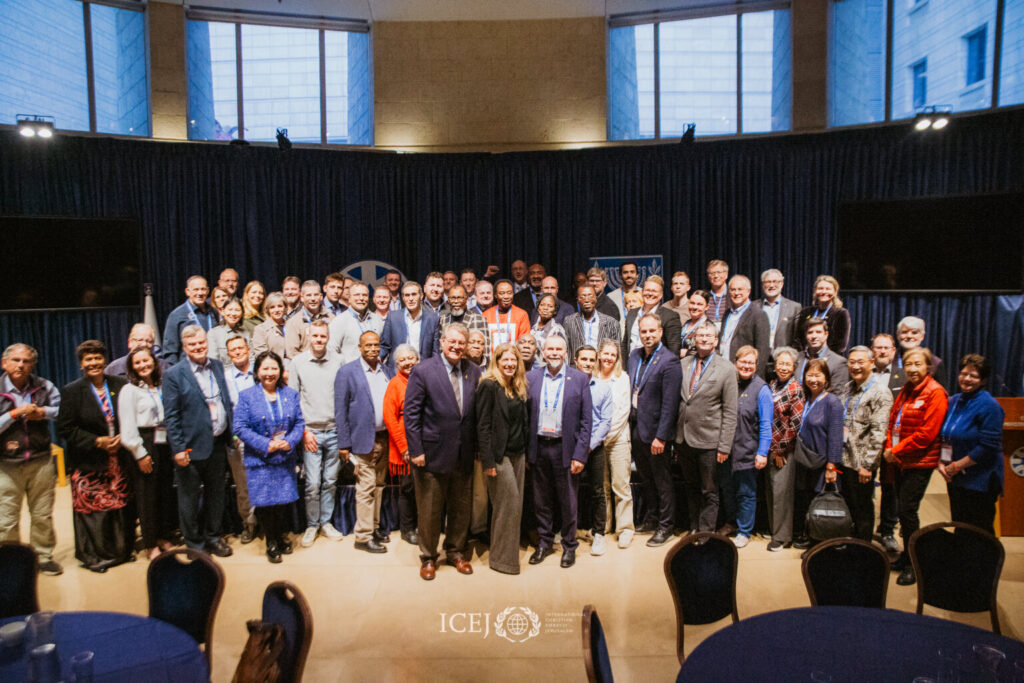
Afterwards, the Envision entourage also visited the Foreign Ministry and heard from the director general Eden Bar Tel about how the atrocities of October 7 have impacted all of Israel. “Each one of us has changed dramatically inside,” he stated. “Frankly speaking, we are not the same people we were two years ago. We are on a journey on a totally new level… There are emotions that we cannot share with the rest of the world and expect that they will feel the same way.”
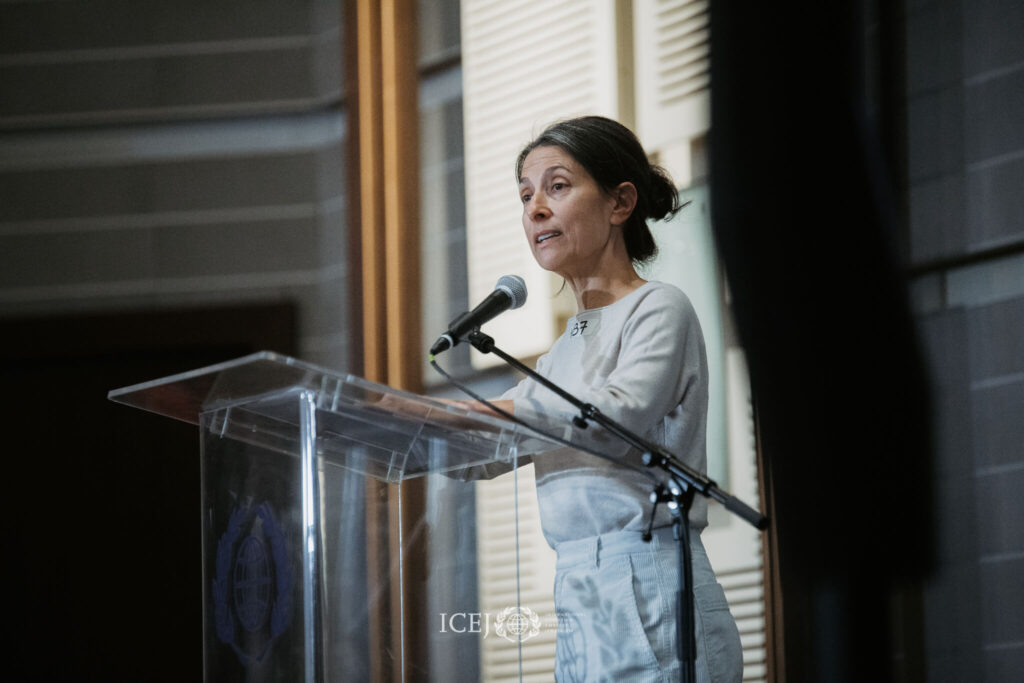
That evening, the conference first heard a moving message from Rachel Goldberg, whose son Hersh was taken hostage on October 7 and tragically murdered while in Hamas captivity. Rachel shared her story of hope amid deep sorrow, inspiring everyone in attendance with her strength and unwavering faith.
The evening concluded with an uplifting message by ICEJ Board Chairman Rev. Ingolf Ellßel, who shared about our relationship with God, the love He offers, and the profound lessons we can learn from Israel in this regard. His words resonated deeply with the delegates, encouraging them to reflect on God’s unwavering love and faithfulness.
DAY THREE
On the third day of Envision, delegates had the unique opportunity to witness firsthand the aftermath of the October 7 tragedy that shook Israel’s southern border area. The group traveled to the Eshkol Region, which spans 60% of Israel’s border with Gaza. It is known as ‘ground zero’ for the devastating events of October 7, as most of the atrocities unfolded there.
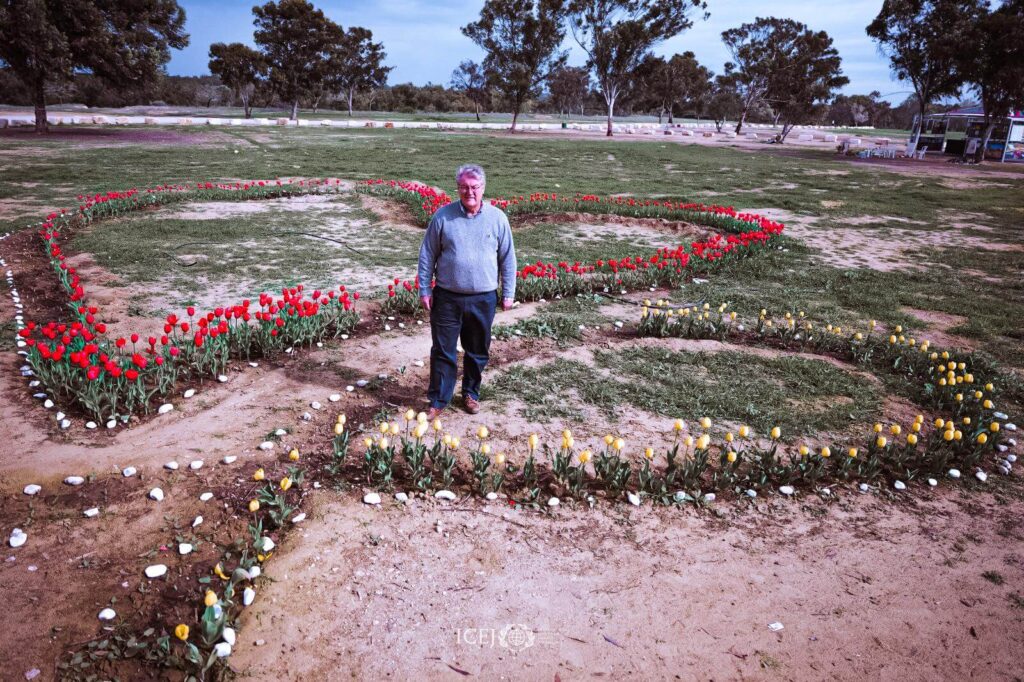
The delegates first made their way to the Nova music festival site, now transformed into a memorial for the some 364 lives lost there. Each victim’s face is displayed with a link to their personal stories online. A tree also has been planted nearby in each victim’s honor. In addition, the ICEJ had partnered with KKL/JNF to plant 1200 red tulips in the shape of a heart and 251 yellow tulips in the shape of a ribbon in honor of those killed and kidnapped, and we found them in full bloom during our visit to the Nova site.
“Seeing all these young faces, it’s difficult to take it all in,” said Morton, a delegate from the UK. “It has the same feeling as Auschwitz. But here, the trees keep growing… There is hope that life goes on.”
“It’s so painful to see so many people who died. There really are no words to describe it,” reflected Maria, a delegate from Dubai. “Yet at the same time, I’m sensing hope. There has been a spiritual shift in Israel towards God. God is doing something. Hopefully, I can bring more people here to witness this.”
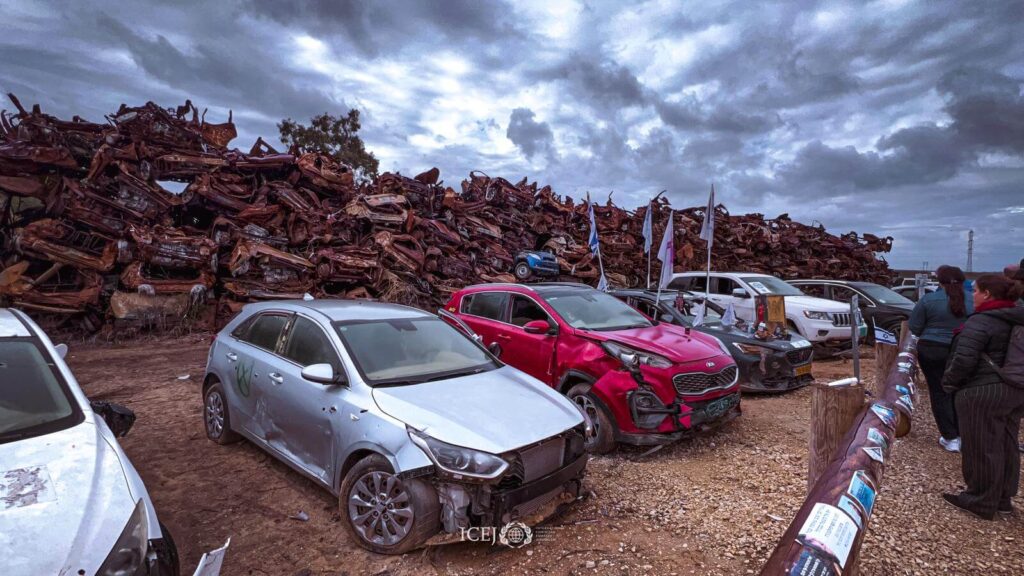
The tour next traveled to the “car graveyard” where over 1600 burned vehicles from October 7 are displayed, many of which were set ablaze with people still trapped inside them. Each car has its own heartbreaking story of those who perished.
“It’s important to come and bear witness because one-day people will say that it didn’t happen,” said Vivienne, ICEJ-South Africa national director.
The delegation then visited the public school compound for the Sha’ar HaNegev region, where three large, fully-equipped bomb shelters, funded by ICEJ branches in Australia, Canada, Switzerland and the USA, were dedicated to protect children undergoing trauma counseling on site.
“From the bottom of our hearts, we thank the ICEJ for understanding our needs, helping to fulfill our dreams and to make these shelters come to life. This is an invaluable asset to our community,” said Maya, head of International Relations for the Sha’ar HaNegev Regional Council.
“You give us the feeling that we are not alone, and this is how we can recover from October 7,” added Nadav, director of the trauma care center. “For that, we thank you.”
The day’s tour culminated in a panel discussion with local community leaders centered on hope, healing, and the future. Rafi, who runs a high-tech incubator center in the area, expressed optimism that “we are not only going to survive, we are going to grow.” This powerful statement encapsulated the resilience of many in the region as they seek to rebuild their lives.
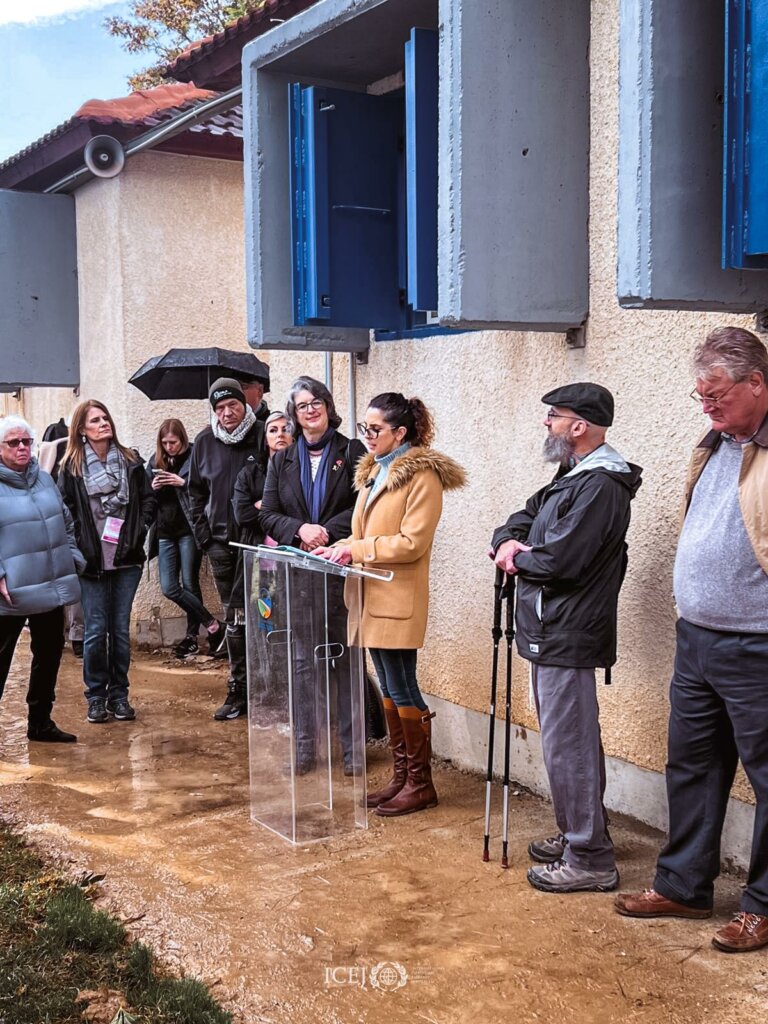
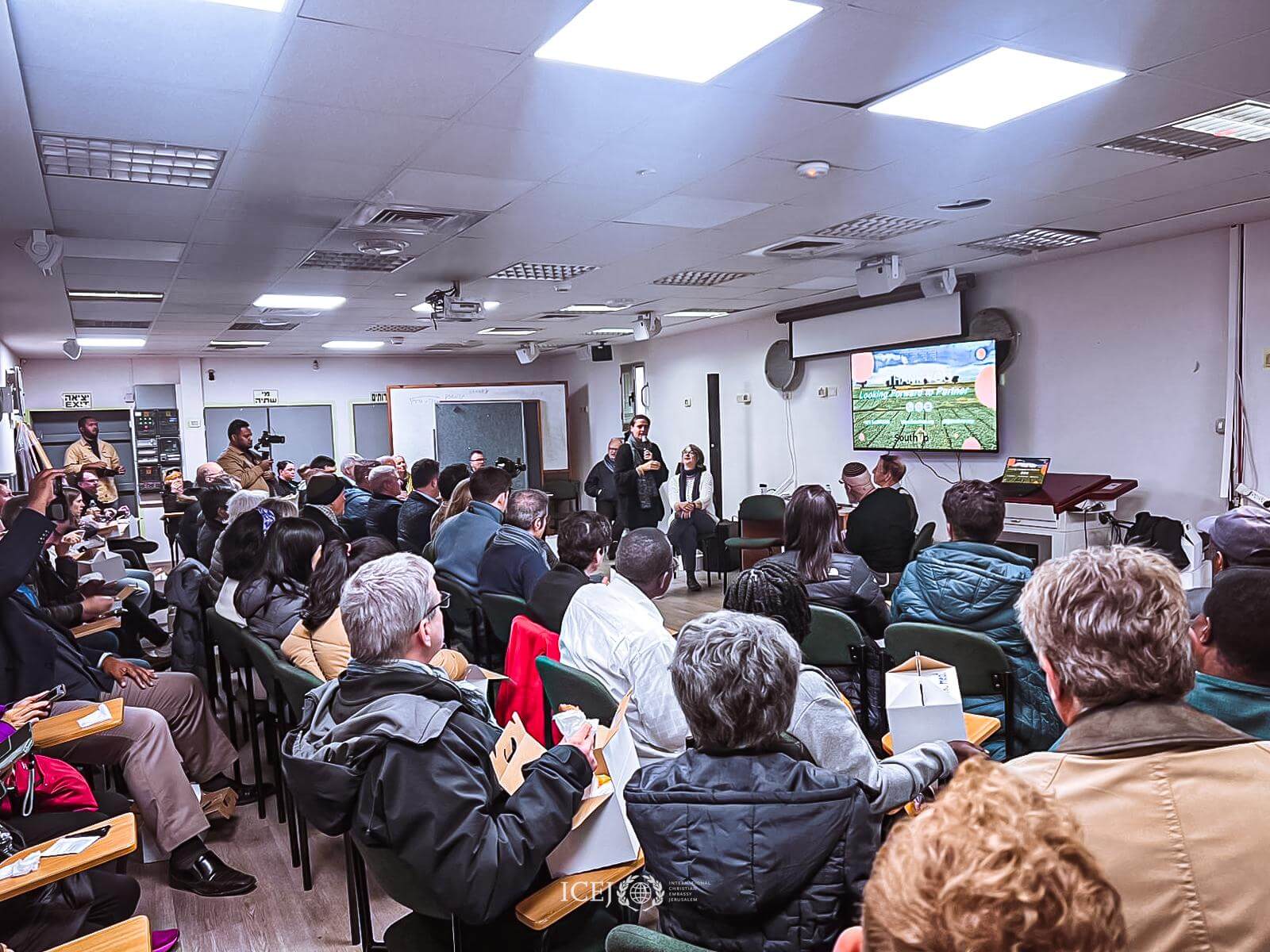
The final stop on the tour was Kibbutz Ruhama, where temporary housing has been constructed for about 60% of the families evacuated from Kfar Aza who still cannot return home. The ICEJ provided house-warming baskets to all the families now residing there while they await the rebuilding of their community over the next year or so.
That evening, local pastor Israel Pochtar from Ashdod shared about his experiences on and since October 7, 2023. He noted how on the day of the massacres, a spiritual heaviness descended on Israel. But as he called his congregation together to pray, the Holy Spirit also came to comfort and opportunities began to arise to show love and support to the broken-hearted and those living in fear. For instance, he recalled how sitting with others in a bomb shelter allowed him to share that Christians were praying for them.
Australian evangelist Tim Hall also ministered that evening and recounted the special connection between Israel and Australia through the Battle of Beersheba in late October 1917, which helped pave the way for Israel’s national rebirth. He added that the prayers of Christians today are having more of an impact in Israel than we will ever know.
DAY FOUR
On the final day of Envision, delegates braved the winter rains and winds as we traveled all the way to the northern border, with a beautiful rainbow appearing along the route. The bus ride up ended in Shlomi, a town right on the border with Lebanon which has endured repeated rocket fire by Hizbullah over the years. Delegates learned that the ICEJ had recently renovated 72 underground bomb shelters in Shlomi. This was part of our support for border communities throughout northern Israel, including the placement of portable bomb shelters, renovating underground shelters, and providing special communication devices to local security and first-responder teams.
The delegation was greeted by Gabi Naaman, the mayor of Shlomi, who stated: “We are surrounded by enemies whose sole goal is to destroy us. If what happened in the South had happened here, none of you would be able to visit today. Despite this, we are a people who seek peace.”
“Thank you for coming to Shlomi and investing in our security,” he continued. “Your contributions have gone beyond simply funding shelters – you renovated them and provided food coupons and communication devices. From the bottom of our hearts, and on behalf of all the residents, thank you. We send you out as ambassadors to speak of peace.”
The group also received a briefing from Tal Hazan, the town’s security chief. He mentioned that the IDF had recently discovered even more terror tunnels along the nearby border, signalling the Israeli military should be in no hurry yet to leave southern Lebanon.
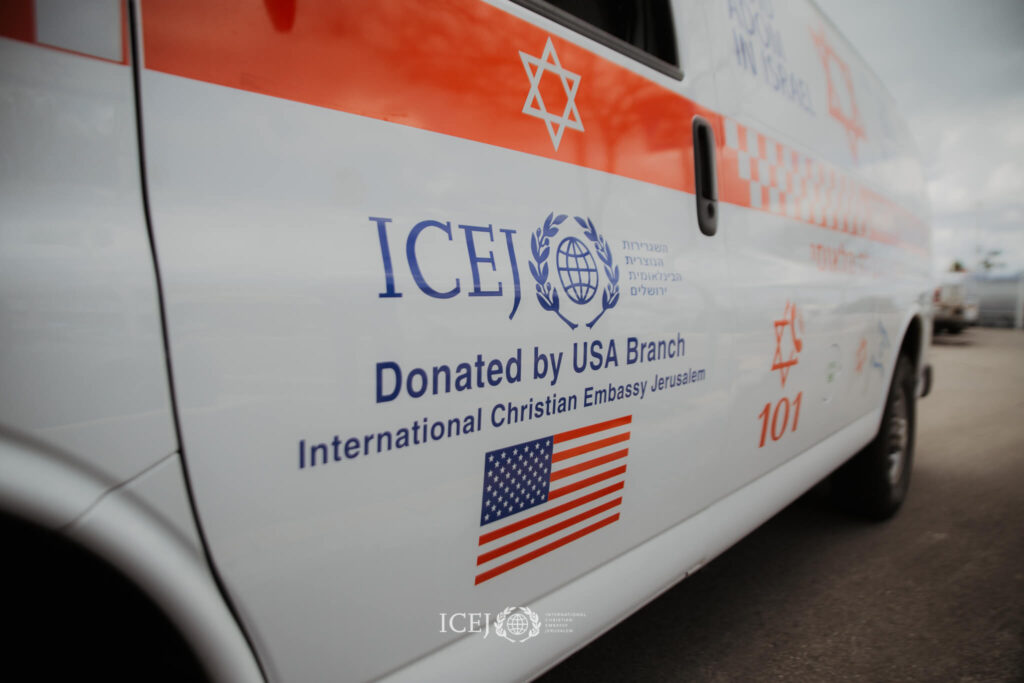
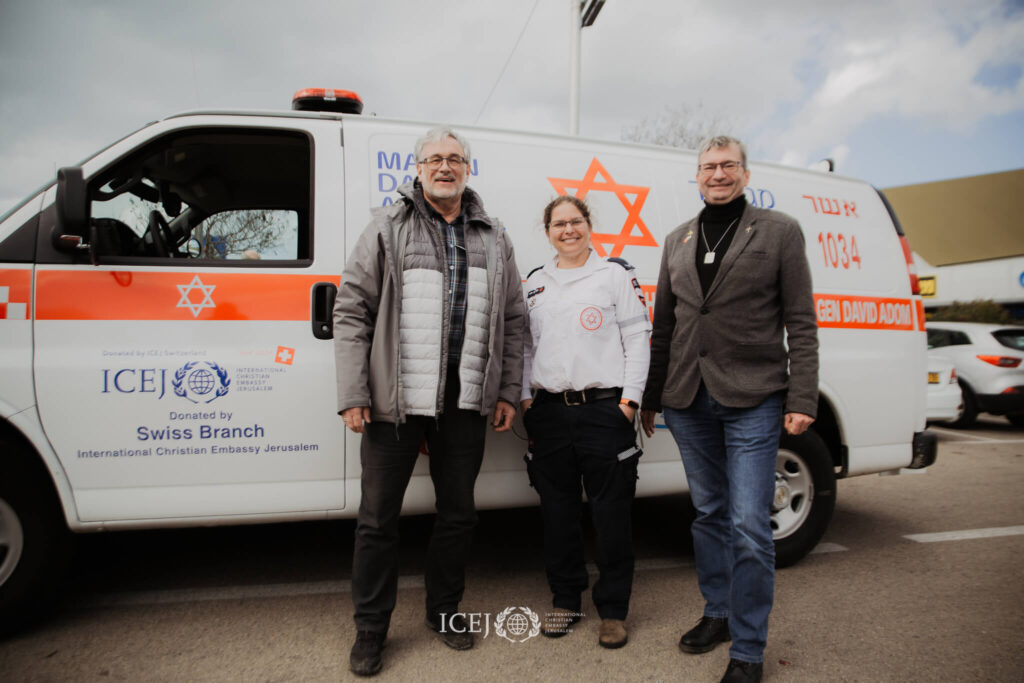
The tour of the North next visited the offices of the Mateh Asher regional council, where ICEJ has also provided bomb shelters and communication devices. The stop also included the dedication of two new ambulances donated to Magen David Adom by the Swiss and American branches of ICEJ. The ambulances will now serve areas of northern Israel. Anne Ayalon, director of Christian Friends of MDA, addressed the gathering and noted “the ICEJ ensures that donations go to truly meaningful causes.”
Later that afternoon, the Envision tour journeyed up to Mount Carmel, where a closing service was hosted by the Kehilat HaCarmel congregation. Co-founding pastor Peter Tsukahira shared a message on Elijah and how the church’s original vision was to restore the altar of the Lord and regather the living stones – the people of the Lord – as one body, Jews and Arabs, as the ‘One New Man.’
Amid a beautiful time of worship in English, Hebrew and Arabic, the gathering joined in joyful dance and offered prayers in several languages.
Dani Sayag, the senior pastor at Kehilat HaCarmel, also spoke on the One New Man, and how the Apostle Paul in Ephesians 2 taught that the dividing wall between Jews and Gentiles had been removed by Christ. “There is one gospel, there is one salvation, and there is one body,” assured Pastor Sayag. “Peace with God, through Messiah, gives us the ability to live in peace with one another.”
Tom Craig, the ICEJ’s Middle East Coordinator, also spoke on the prophetic vision of regional reconciliation foreseen in the ‘Isaiah 19 Highway.’
It was a unique experience for the Envision pastors to see and experience how God is moving to bring Jewish and Arab believers together in Christ even in the midst of a long and difficult war in Israel.
This year’s Envision conference, though held during a time of conflict and fragile ceasefires on two fronts, was marked by powerful teachings, worship, and heartfelt discussions. Participants from around the world came together to pray for Israel, deepen their faith, and gain new perspectives on the biblical roots of the Christian faith.


